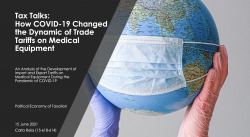The Twentieth Century revealed that countries with similar economic development like South Africa and Brazil have significant differences in taxing personal income ranging from 4% in Brazil to almost 16% (% GDP) in South Africa by the end of the century. In his predominant cross-country comparison Evan S. Liebermann argued that the National Political Community was ultimately responsible for the differences in the development of income policies. Within the three volumes of Podcast’s I will elaborate and discuss the National Political Communities and Income Taxation in both countries in the twenty first century and provide meaningful insights from Tax specialist.
Category: Developing World
Tax affiliation of multinationals in view of the permanent establishment definition

International profit shifting allows multinationals to save immense amounts of taxes. However, there are many stakeholders involved in international tax competition. For instance, developing countries suffer from tax shifting strategies, while multinationals benefit by shifting profits to tax havens. In determining the taxes, the permanent establishment plays a key role. The OECD’s Base Erosion and Profit Shifting (BEPS) Action 7 is an approach to prevent the avoidance of permanent establishment status. In this podcast, I will do a holistic analysis of this topic.
The Tampon Tax

The tampon tax has become an on-going discussing topic. Support to repeal this tax has increased in the last years, with activists arguing that menstrual hygiene products should be classified as tax-exempt necessities, alongside other items such as food, tap water and medicine. This issue pertains to gender equality, affordability and women’s health. While the large majority of the countries around the world still tax menstrual hygiene products as non-essential goods, some countries are starting to lift or reduce the tax. In 2004, Kenya became a trailblazer when it was the first country in the world to repeal the tampon tax. Listen to this podcast to learn more on the topic, by discovering both sides of the argument, and understanding the implications following an amendment of the tax.
Tax Talks: How COVID-19 Changed the Dynamics of Trade Tariffs Medical Equipment

COVID-19 has changed the dynamics of how our world functions today. Wearing masks has become the new “normal” and could be considered a mandatory accessory. However, how did states manage to make medical products available on a large scale? This podcasts discusses how COVID-19 has changed trade and tariffs of medical supplies and how this can have an impact on medical care.
A Global Minimum Tax Rate?
In this episode of Tax Talk, we will be talking about last week’s G7 agreement to implement a global minimum tax rate, what it means, and how it affects developing countries and smaller economies.
Trade Liberalization and VAT Reforms in Developing Countries
While being a primary source of income for many developing and transitional countries, trade taxes such as tariffs arguably discourage the welfare-enhancing activity that international trade has been shown to be. Therefore, developing countries had been recommended to reduce the barriers to trade and open up their economies. The value-added tax, VAT, was key in the attempt to recoup the revenues lost in developing countries. But to what extent has the VAT actually been successful in doing so? Judging from the experience of developing countries, what factors make a successful substitution of trade revenues through VAT more likely? And what elements can account for the failure of VAT tax reform in a country such as Bangladesh?
Semi-Autonomous Revenue Authorities in Sub-Saharan Africa
“This is a tax world“, the weekly podcast to understand the complex world of taxation, the podcast for citizens who want to better understand how taxation structures our lives, but also what taxation looks like around the globe. For this episode we travel south of the Sahara, in Africa, to discover a very special type of tax administration, the Semi-Autonomous Revenue Authorities (SARAs), welcoming our expert on tax issues in developing countries: Ryad Selmani ! […]
Recent Comments